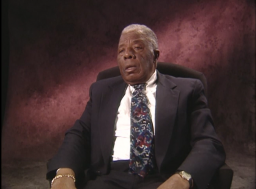<< Previous | Displaying results 476-500 of 571 for "" | Next >>
-
Leo Schneiderman describes arrival at Auschwitz, selection, and separation from his family
Oral HistoryThe Germans invaded Poland in September 1939. Leo and his family were confined to a ghetto in Lodz. Leo was forced to work as a tailor in a uniform factory. The Lodz ghetto was liquidated in 1944, and Leo was deported to Auschwitz. He was then sent to the Gross-Rosen camp system for forced labor. As the Soviet army advanced, the prisoners were transferred to the Ebensee camp in Austria. The Ebensee camp was liberated in 1945.
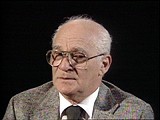
-
Lilly Appelbaum Malnik describes the process of registration in Auschwitz
Oral HistoryGermany invaded Belgium in May 1940. After the Germans seized her mother, sister, and brother, Lilly went into hiding. With the help of friends and family, Lilly hid her Jewish identity for two years. But, in 1944, Lilly was denounced by some Belgians and deported to Auschwitz-Birkenau via the Mechelen camp. After a death march from Auschwitz, Lilly was liberated at Bergen-Belsen by British forces.
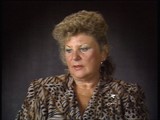
-
Henny Fletcher Aronsen describes arrival at the Stutthof camp
Oral HistoryHenny was born into an upper-middle-class Jewish family in Kovno, Lithuania. She and her brother attended private schools. In June 1940 the Soviets occupied Lithuania, but little seemed to change until the German invasion in June 1941. The Germans sealed off a ghetto in Kovno in August 1941. Henny and her family were forced to move into the ghetto. Henny married in the ghetto in November 1943; her dowry was a pound of sugar. She survived several roundups during which some of her friends and family were…
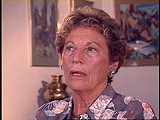
-
Doris Greenberg describes arrival procedures at Ravensbrück
Oral HistoryThe Germans invaded Poland in 1939 and established a ghetto in Warsaw in 1940. After her parents were deported, Doris hid with her sister and other relatives. Doris's sister and an uncle were killed, and she learned that her parents had been killed. Her grandmother committed suicide. Doris was smuggled out of the ghetto and lived as a non-Jewish maid and cook, but was ultimately deported to the Ravensbrück camp. Upon arrival there, Doris and her friend Pepi contemplated swallowing poison, but decided…
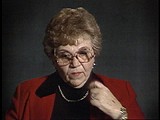
-
Siegfried Halbreich describes conditions and forced labor in the Gross-Rosen camp
Oral HistoryAfter Germany invaded Poland on September 1, 1939, Siegfried fled with a friend. They attempted to get papers allowing them to go to France, but were turned over to the Germans. Siegfried was jailed, taken to Berlin, and then transported to the Sachsenhausen camp near Berlin in October 1939. He was among the first Polish Jews imprisoned in Sachsenhausen. Inmates were mistreated and made to carry out forced labor. After two years, Siegfried was deported to the Gross-Rosen concentration camp, where he was…
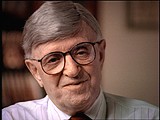
-
Morris Kornberg describes arrival at Auschwitz
Oral HistoryMorris grew up in a very religious Jewish household and was active in a Zionist sports league. When the Germans invaded Poland in September 1939, Morris's town was severely damaged. Morris's family was forced to live in a ghetto, and Morris was assigned to forced labor. After a period of imprisonment in Konskie, a town about 30 miles from Przedborz, Morris was deported to the Auschwitz camp. He was assigned to the Jawischowitz subcamp of Auschwitz. In January 1945, Morris was forced on a death march and…
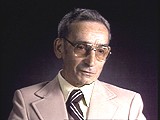
-
Ruth Webber describes witnessing a brutal punishment in the camp at Ostrowiec
Oral HistoryRuth was four years old when the Germans invaded Poland and occupied Ostrowiec. Her family was forced into a ghetto. Germans took over her father's photography business, although he was allowed to continue working outside the ghetto. Before the ghetto was liquidated, Ruth's parents sent her sister into hiding, and managed to get work at a labor camp outside the ghetto. Ruth also went into hiding, either in nearby woods or within the camp itself. When the camp was liquidated, Ruth's parents were split up.…

-
Abraham Bomba describes gassing operations at Treblinka
Oral HistoryDescribes gassing operations at Treblinka
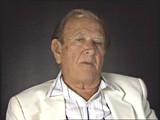
-
Abraham Bomba describes the Treblinka gas chambers
Oral HistoryExcerpt from Holocaust survivor Abraham Bomba's oral history testimony describing gas chambers at the Treblinka killing center.
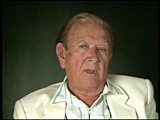
-
Esther Raab recalls the arrival of transports in Sobibor
Oral HistoryEsther was born to a middle-class Jewish family in Chelm, Poland. In December 1942, she was deported from a work camp to the Sobibor killing center in occupied Poland. Upon arrival at Sobibor, Esther was selected to work in a sorting shed. She sorted clothing and the possessions of the people killed at the camp. During the summer and fall of 1943, Esther was among a group of prisoners in the Sobibor camp who planned an uprising and escape. Leon Feldhendler and Aleksandr (Sasha) Pechersky were the leaders…
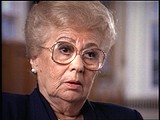
-
Tomasz (Toivi) Blatt describes gassing operations in the Sobibor killing center
Oral HistoryTomasz was born to a Jewish family in Izbica. After the war began in September 1939, the Germans established a ghetto in Izbica. Tomasz's work in a garage initially protected him from roundups in the ghetto. In 1942 he tried to escape to Hungary, using false papers. He was caught but managed to return to Izbica. In April 1943 he and his family were deported to Sobibor. Tomasz escaped during the Sobibor uprising. He went into hiding and worked as a courier in the Polish underground.
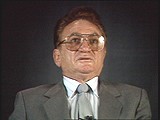
-
Sam Itzkowitz describes the gas chambers in Auschwitz
Oral HistoryThe Germans invaded Poland in September 1939. When Makow was occupied, Sam fled to Soviet territory. He returned to Makow for provisions, but was forced to remain in the ghetto. In 1942, he was deported to Auschwitz. As the Soviet army advanced in 1944, Sam and other prisoners were sent to camps in Germany. The inmates were put on a death march early in 1945. American forces liberated Sam after he escaped during a bombing raid.
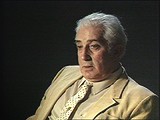
-
Ruth Meyerowitz describes her memories of the Auschwitz crematoria
Oral HistoryIn Frankfurt, Ruth's family faced intensifying anti-Jewish measures; her father's business was taken over and Ruth's Jewish school was closed. In April 1943, Ruth and her family were deported to Auschwitz. Ruth was selected for forced labor and assigned to work on road repairs. She also worked in the "Kanada" unit, sorting possessions brought into the camp. In November 1944, Ruth was transferred to the Ravensbrueck camp system, in Germany. She was liberated in May 1945, during a death march from the…
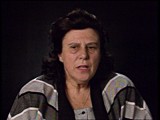
-
Franz Wohlfahrt describes the trial and sentencing of his father
Oral HistoryFranz and his family were Jehovah's Witnesses. Germany annexed Austria in 1938. After World War II began, Franz's father was executed because, as a Witness, he opposed war. In 1940, Franz refused to participate in military training and would not salute the Nazi flag. He was imprisoned, interrogated by the Gestapo (German Secret State Police) in Graz, and sentenced to five years of hard labor in a camp in Germany. Franz was liberated by US forces in 1945.
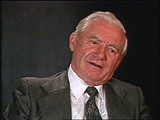
-
Franz Wohlfahrt describes imprisonment in Graz
Oral HistoryFranz and his family were Jehovah's Witnesses. Germany annexed Austria in 1938. After World War II began, Franz's father was executed because, as a Witness, he opposed war. In 1940, Franz refused to participate in military training and would not salute the Nazi flag. He was imprisoned, interrogated by the Gestapo (German Secret State Police) in Graz, and sentenced to five years of hard labor in a camp in Germany. Franz was liberated by US forces in 1945.
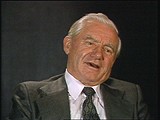
-
Robert Wagemann describes fleeing from a clinic where, his mother feared, he was to be put to death by euthanasia
Oral HistoryRobert and his family were Jehovah's Witnesses. The Nazis regarded Jehovah's Witnesses as enemies of the state for their refusal to take an oath of loyalty to Adolf Hitler, or to serve in the German army. Robert's family continued its religious activities despite Nazi persecution. Shortly before Robert's birth, his mother was imprisoned briefly for distributing religious materials. Robert's hip was injured during delivery, leaving him with a disability. When Robert was five years, he was ordered to report…
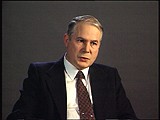
-
Abraham Bomba describes cutting women's hair before they were gassed in Treblinka
Oral HistoryAbraham was raised in Czestochowa, Poland, and became a barber. He and his family were deported to the Treblinka killing center from the Czestochowa ghetto in 1942. At Treblinka, Abraham was selected for forced labor. He was forced to cut women's hair before they were gassed, and he sorted clothing from arriving transports. Abraham escaped from the camp in 1943 and made his way back to Czestochowa. He worked in a labor camp from June 1943 until liberation by Soviet troops in 1945.
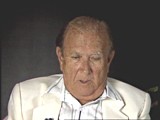
-
Miso (Michael) Vogel describes the crematoria at Auschwitz-Birkenau
Oral HistoryIn 1939, Slovak fascists took over Topol'cany, where Miso lived. In 1942, Miso was deported to the Slovak-run Novaky camp and then to Auschwitz. At Auschwitz, he was tattooed with the number 65,316, indicating that 65,315 prisoners preceded him in that series of numbering. He was forced to labor in the Buna works and then in the Birkenau "Kanada" detachment, unloading incoming trains. In late 1944, prisoners were transferred to camps in Germany. Miso escaped during a death march from Landsberg and was…
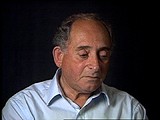
-
Gerda Haas describes prewar Jewish community life in Ansbach
Oral HistoryGerda was raised in a religious family in the small town of Ansbach, Germany, where her father was the Jewish butcher. She attended German schools until 1936, and then moved to Berlin to attend a Jewish school. She returned to her hometown after Kristallnacht in November 1938. Her family was then ordered to move to Munich, and in July 1939 her father left for England and then the United States. He was unable to arrange for the rest of his family to join him. Gerda moved to Berlin in 1939 to study nursing.…
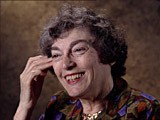
-
Lilly Appelbaum Malnik describes death march from Auschwitz to Bergen-Belsen
Oral HistoryGermany invaded Belgium in May 1940. After the Germans seized her mother, sister, and brother, Lilly went into hiding. With the help of friends and family, Lilly hid her Jewish identity for two years. But, in 1944, Lilly was denounced by some Belgians and deported to Auschwitz-Birkenau via the Mechelen camp. After a death march from Auschwitz, Lilly was liberated at Bergen-Belsen by British forces.
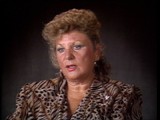
-
Lily Mazur Margules describes death march from a labor camp near Stutthof
Oral HistoryLily was forced into a ghetto after the Germans occupied Vilna in 1941. She was forced to work until the liquidation of the ghetto in 1943 when she was deported to the Kaiserwald camp near Riga, Latvia. From there she was sent to work in the Duenawerke labor camp. She was deported by ship across the Baltic Sea to the Stutthof camp and was taken to a nearby labor camp. Lily was liberated during a death march which ended in the town of Krumau, East Prussia, in 1945.
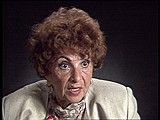
-
Barbara Marton Farkas describes the death march from the Gross-Rosen camp in Germany
Oral HistoryBarbara was born in the province of Arad in northern Transylvania, Romania. She went to school until the Hungarian army occupied the area in 1940 and she was no longer allowed to attend. After the Germans occupied Hungary in 1944, discrimination against Jews intensified. Barbara and her family were forced into the Oradea ghetto. She worked in the ghetto hospital until she was deported to the Auschwitz camp. At Auschwitz, she worked in the kitchens to receive extra food. She was deported to another camp,…
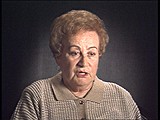
-
Gary Bigus describes Berlin during the 1936 Olympics
Oral HistoryGary (Gerhard) was born in Berlin, Germany, in 1924. His father owned a men’s clothing store. As a child, Gary faced antisemitism from his peers. His family’s store was boycotted several times, and ultimately destroyed in 1938 during Kristallnacht. As the city prepared for tourists to arrive in Berlin for the 1936 Olympics, Gary noticed anti-Jewish signs vanish from storefronts. In 1939, Gary and his parents escaped Germany after securing passage to Shanghai, China. His father died of illness in…
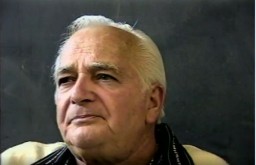
-
Peter Becker describes indoctrination and being in the Hitler Youth
Oral HistoryPeter was six years old when his mother enrolled him in a special Hitler boarding school for future Nazi Party officials in 1935. He studied traditional academic subjects, but was constantly exposed to Nazi ideas and prepared for a military life. Peter was also a member of the Hitler Youth. He came to believe in Hitler as the savior of Germany. Peter would later describe his indoctrination as a subtle process. It took two years after the war had ended for Peter to come to terms with the atrocities that the…

-
John Woodruff describes winning an Olympic medal
Oral HistoryIn 1936, John Woodruff was one of 18 African Americans on the US Olympic team competing in Berlin. He won the gold medal for the men's 800-meter race. In this clip he describes his feelings upon winning the medal. Interview date: May 15, 1996
